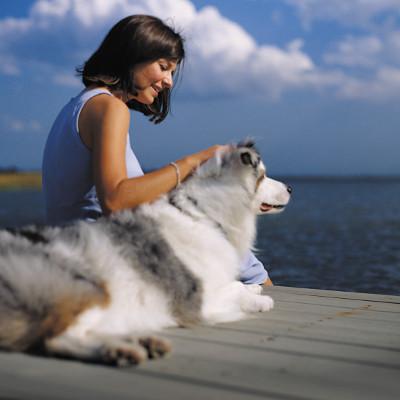Daisy is an adoptable senior pet. (see bottom of post for link to her page)
 Pet ownership is a long-term commitment. Many get excited about raising and playing with a young pup or kitten and forget to think of the responsibilities that come with owning a pet. Injuries and illnesses, changing diets, expensive procedures, coping with disease and death aren’t exactly the first thing that comes to mind when you see those big beady eyes looking up at you. However, as your young pal begins to grow you need to start preparing yourself for life as a senior pet owner.
Pet ownership is a long-term commitment. Many get excited about raising and playing with a young pup or kitten and forget to think of the responsibilities that come with owning a pet. Injuries and illnesses, changing diets, expensive procedures, coping with disease and death aren’t exactly the first thing that comes to mind when you see those big beady eyes looking up at you. However, as your young pal begins to grow you need to start preparing yourself for life as a senior pet owner.
When is my pet a “senior”?
While larger breeds hit their senior years earlier than small dogs, most dogs hit their senior years somewhere between 7 and 10 human years old. Cats become “seniors” a bit later, usually at 10-12 human years. As your pet ages you’ll begin to notice her hearing isn’t what it used to be. Her coat may be thinner and grayish. She’ll have a harder time getting up and moving in the morning.
It’s very important to keep up with these changes because as she ages she’ll be more susceptible to a number of illnesses and injuries. Your vet will most likely increase the number of times your pal needs to come in for a checkup, so he/she can identify potential health risks sooner. Your vet will also help you create a new schedule to make sure your aging pet is getting proper care and the proper diet.
Dietary Changes
While cats tend to create their own schedule, dogs need to be on a set routine. From the first time they are let out in the morning until they curl up in their bed for the night, keeping your pal on a schedule will help relieve the stress of not knowing when he’s going to eat or be locked inside for the night. Even if your dog is already on a schedule, you may need to change it up a bit to compensate for his new dietary needs. These new dietary needs are the first major change most senior pets owners must face.
As your cat or dog ages he’ll go through metabolic and immunolic changes that cannot be supported by his normal food. Since older pets are not able to exercise as much as they did when they were younger, obesity is a huge health risk. Because his body composition will change as he gets older, even if you simply feed him less of the same food, he can still gain weight. These changes mean it's important that you feed him food that is high in protein with a low caloric density. Protein rich food is essential to maintain good muscle mass. Without protein your pet will face a higher risk of developing muscle problems and will face an even higher risk of becoming obese.
Beauty is looking for a forever home too. (see bottom of post for link to her page)
Senior Pet Aliments Arthritis
In the United States alone, more than 60 million dogs, and even more cats, suffer from joint problems. As your pet ages her risk for arthritis, rheumatism and other inflammatory problems will become more evident.
Like joint problems in humans, your pet will have a harder time doing normal activities like standing up, getting up and down stairs and may begin to have troubles walking. To give your pet some much needed relief from joint pain, you should consider heat therapy. While something like a heated bed may seem luxurious, it is actually a healing product your aging pet needs for pain relief.
Blindness
If your pet seems to be having a hard time finding his food bowl, paws at or squints his eyes frequently and seems to misjudge heights you need to see your vet. After an exam is completed your vet may ask you to prepare your home for your pet’s vision loss. You’ll need to place barriers around areas he can get into and potentially hurt himself. You will also have to be more conscious of where you place things throughout your home. Suddenly deciding to move something as small as a side table can cause a great deal of confusion as your pet’s vision deteriorates.
One way to get your pet used to your home as his sight gets worse is to mark your home with different scents. Simply using different types of scented candles or air fresheners in different rooms can be a great aid for your pal. Also, make sure your pet has time to get used to your scent and the scent of visitors. Announce your entrance when you come into the house and let him sniff your hand so you don’t frighten him. If you have guests over make sure you introduce them by letting him sniff their hands as well.
Check out Henna's page and consider adopting her. (see bottom of post for link to her page)
Cancer
Cancer can strike at anytime, however it’s much more common in senior pets. Since your pet obviously can’t tell you that something is wrong, it is important that you examine your pet for lumps a few times a year.
One problem with identifying cancer symptoms in pets is that they are similar to what you would see from a number of different illnesses. Symptoms like swelling, sores, lethargy, bad breathe and decreased appetite could be caused by a number of different things.
It is important to take your pet to the vet if you see these problems, but don’t get too overwhelmed. Our minds tend to go directly to the worst possible scenario. It’s better to prepare yourself just in case, but to keep a positive outlook as well.
These are just a few of the things you may face as your pet gets older. There are a ton of great articles and books you can read to help prepare you for life with a senior pet. There are also a lot of amazing products like heated beds, cooling pads and toys that can help you keep your pal comfortable as he ages.







